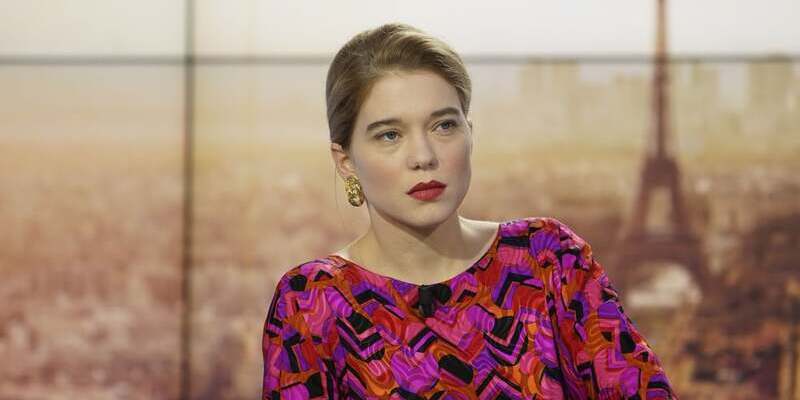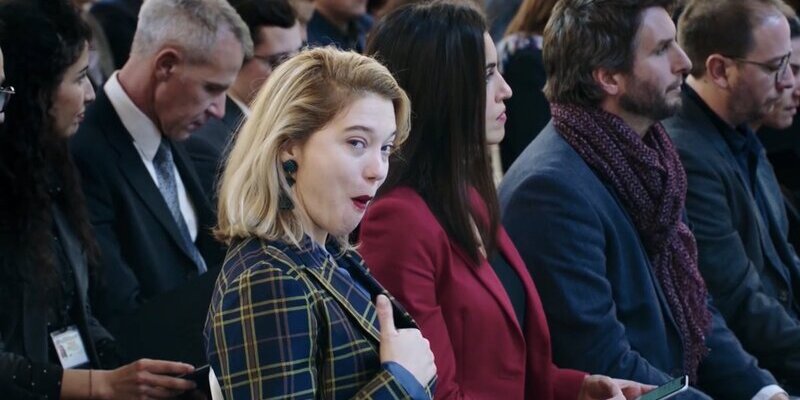![New Release Review [MUBI] - FRANCE](https://blogger.googleusercontent.com/img/b/R29vZ2xl/AVvXsEil71_U_TCAZ6JWd5bacMTVttgCOhOlLaGHMxIGQfzNqOUrhjuSXKHrT6RkVmmNZ_I80zrl0u8xLX3kBfjy2pzjibk2oTD8Ltrp2qXnyadQ9JB1zmbSty48-X2xopN2kVFQ7_o1PGicJLS8Sm1jdeUxdVCMSuDYtdiQ0GTZSkJLKbaYa0OwKQFMLe9q/s16000/france-review.jpg)
Review by
Benjamin Poole
Directed by: Bruno Dumont
Starring: Léa Seydoux, Benjamin Biolay, Blanche Gardin, Emanuele Arioli

France, the central character of take-him-or-leave-him auteur
Bruno Dumont’s France, is a news reporter whose Parisian celebrity falls somewhere between
Emily Maitlis and Kate Garraway: respected for her unflinching reportage
of frontline combat, the glamorous France is also a recurrent,
aspirational feature on the covers of tabloid mags.
As France’s significant running time unspools there is an ongoing leit motif of
extras and minor characters interacting with France with an open-faced
awe, a grinning stupefaction which betrays the para-social connections
they have to this persona, and which enables France to behave in ways
which belie the trust they have in her perceived status (even as it
further isolates her in increasing emotional purgatory, the focus of the
eventual narrative).

Played by Léa Seydoux, France herself is a capricious and opaque
presence. Aloof, but silly; opportunist, yet seemingly jaded to the
largesse her profile affords her; Seydoux’s performance of this strange
woman is highly watchable. An opening sequence sees France at a press
conference for the president, yet throughout Macron’s performance, France
goofs off, making funny faces across the room to her workmate while Macron
addresses the press. Unprofessional!
The aptitude France displays for multi-tasking (pissing about while
addressing a head of state) does not, however, extend to driving and using
the phone. En route she knocks over a moped user at low speed, which
serves as a peripeteia of sorts for the
one-part-guilty-to-two-parts-aware-how-this-could-play-out-for-her-profile
France. She gives the courier a lump sum, and apologies to his parents
(who are glassily star struck by her) but the matter is not so easily
remedied. Her husband isn’t happy for a start, which further fractures
their bourgeoise complacency. Retreating to a spa, she falls in with a
fella who may just provide her with the real sensations of love she
craves, but who actually turns out to be an undercover reporter. Ooops.

The irony is as bold as France’s bright red lipstick and severely
lacquered hair, but throughout France you may wonder at what
level the satire is pitched. Is it at news media and pernicious celebrity
culture, or is France a mockery of the sort of films which
take aim at such obvious targets? From the broad stroke of the eponymous
title to a seemingly earnest run through of the old
Broadcast News switcheroo skit, the viewer questions whether
the former provocateur Dumont would ever be so facile. If somewhere the
joke has been missed, and if, in fact, that Dumont is taking le mick on
another level.
Certainly, the depiction of France’s day job has a detailed verisimilitude
and seems straight faced in its presentation. We see her rush towards
exploding danger in Africa, and in a story closer to home she purports to
travel with refugees, who are crossing the channel in destitution.
However, even here France’s motivations are ambiguous: is she grifting for
ratings, sincerely doing her job, or is the truth somewhere between? The
apparent uncertainty is pleasing, what isn’t, however, is the lingering
suspicion that Dumont is again simply offering a didactic condemnation of
24-hour news cycles, which these cold-eyed representations of suffering,
so close to the real world, would support in their human horror.

In another layer though (this one of plush and fabulous fabric), one
wonders if ideology even matters: after all, for every single delicious
minute of screen time she has, Seydoux is at god level here. And her
costumes! A character consoles with the statement that "things only last
24 hours now." Maybe, but a day later I am still wondering which of
France’s amazing outfits was my favourite; the satin top with a likewise
lilac short sleeve jacket, the lux pink trouser suit, the snow wear?
(Thank you, costume designer Alexandra Charles).
Put bluntly, Seydoux is just so cool isn’t she: come on, don’t you want to
be more like her? That insistent intelligence behind those inscrutable,
wide features? The imperial aloofness? Seydoux’s remoteness is essential
to France, captivating us even when we are not sure the film deserves our focus,
or if the so-so principles warrant close attention. Like the open-mouthed
plebs who buckle in the presence of France’s recognisability, we too are
spellbound, without really understanding why. Perhaps then Dumont’s
direction of this incredible actor and the delineation of her volatile
character is the ultimate testimony of his intention, and of this
similarly mercurial director’s playful nihilism.

France is on MUBI UK from December
29th.
